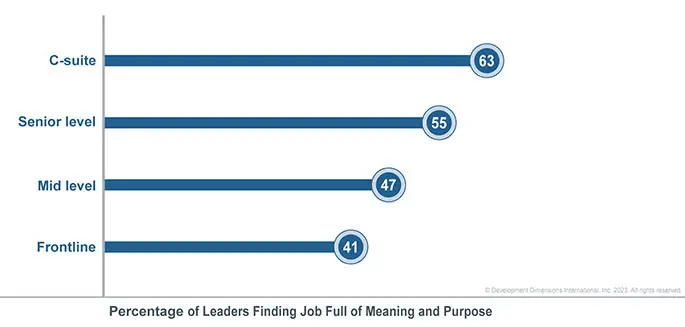GLOBAL LEADERSHIP FORECAST 2023
BY THE NUMBERS
Many Leaders Don't Feel a Strong Sense of Purpose

Leaders Struggle to Find a Sense of Purpose and Fully Engage
Is work only a means to a paycheck, or does it need to offer people a deeper sense of purpose and connection? In the wake of the pandemic, many workers have changed their personal and professional priorities. As companies scramble to compete for workers, many are building a case for purpose in their organizations.
At the C-suite level, less than two-thirds say they find their job full of meaning and purpose.
But so far, this case may not be effective. Our data shows that less than half of leaders definitely find their jobs to be purposeful. The purpose deficit is strongest in first- and second-line leaders, who may be more removed from conversations around strategic objectives. But even at the C-suite level, less than two-thirds say they find their job full of meaning and purpose, which is surprisingly low considering the time and energy required from these leaders.
Given the high bar, many company leaders may wonder how important it is to build purpose into their company culture. But our research shows substantial benefits. When leaders feel a strong sense of purpose, they are:
- 9X more likely to feel engaged in their role.
- 2.4X more likely to intend to stay at the company for the next year.
Individual leaders’ sense of purpose also has a cascading effect throughout the organization. If leaders struggle to find purpose in their work, their teams will likely have a harder time feeling a sense of connection and meaning as well.
WHERE TO FOCUS
Infuse Purpose into Leadership from the Top Down
What differentiates those with a strong sense of purpose from those without one? We looked for actions that leaders can take to bolster a stronger sense of purpose at any level. They are:
1.
Conduct frequent and meaningful career conversations.
When leaders see their next potential move, they have a better understanding of how they can grow within the company and contribute—now and in the future. When leaders understand their career path, they are 4X more likely to find their jobs full of meaning and purpose than those that do not.
2.
Clarify what “success” looks like.
A clear expectation of what is considered good performance guides leaders to think about the role they play and how important their contributions are.
3.
Encourage self-reflection.
When leaders have time to think about the work they are doing and their company’s strategic objectives, they can connect the dots. They can also think of innovative solutions to move the needle.
4.
Ensure leaders have the tools to do their jobs well.
Leaders who say they have the tools to do their jobs well are 5X more likely to find their jobs full of meaning and purpose than those who do not.
When leaders have meaningful career pathing conversations, understand expectations, self-reflect, and have the right tools, they are more likely to feel a sense of purpose. In fact, 87% of leaders who have these experiences definitely find their job full of meaning and purpose, compared to only 25% of leaders who do not have these experiences.
BY THE NUMBERS
Leadership Purpose by Industry

Data Dive

When leaders understand their career path, they are 4X more likely to find their jobs full of meaning and purpose
